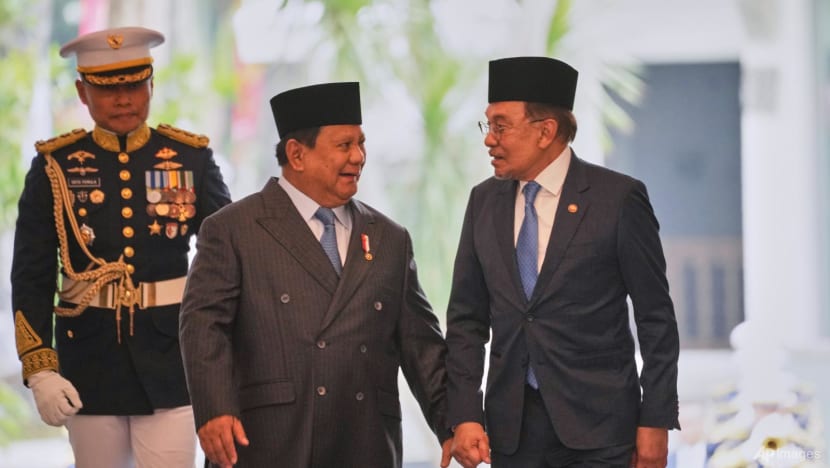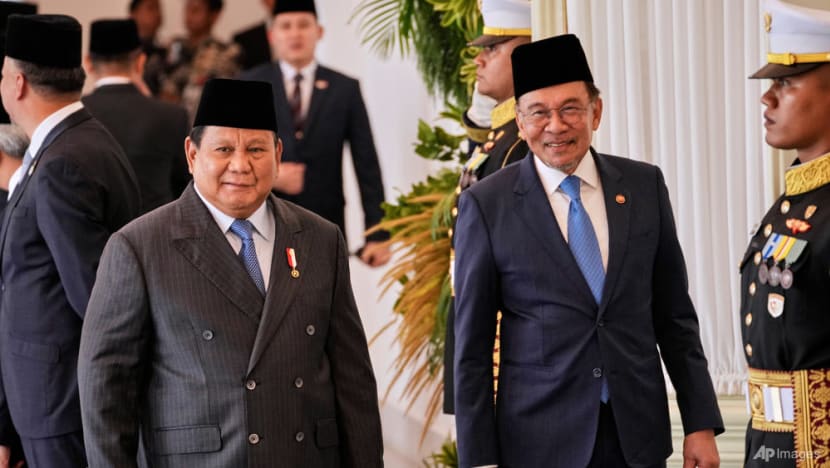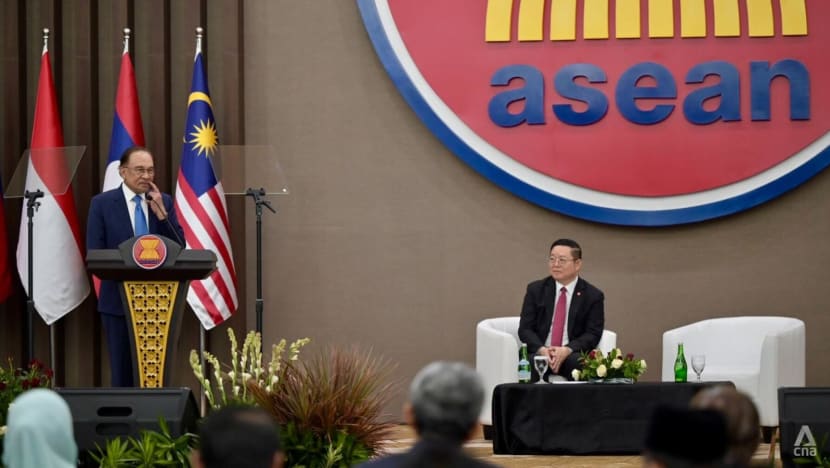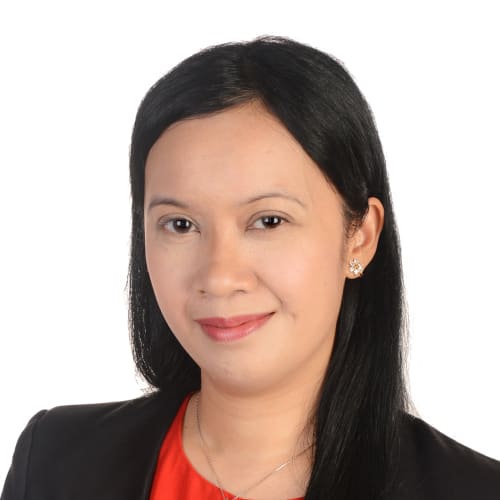Indonesia says ‘ready to help’ ASEAN chair Malaysia on Thai-Cambodia conflict, regional stability
Indonesia’s President Prabowo Subianto hosted Malaysia’s Prime Minister Anwar Ibrahim in Jakarta on Tuesday (Jul 29) for the two countries' first bilateral annual consultations since 2017.

Indonesian President Prabowo Subianto (left) with Malaysian Prime Minister Anwar Ibrahim (right) during their meeting at Jakarta's Merdeka Palace on Jul 29, 2025. (Photo: AP/Achmad Ibrahim)

This audio is generated by an AI tool.
JAKARTA: Indonesia is “actively communicating” with Malaysia to encourage de-escalation of the Thai-Cambodian conflict, the presidential palace in Jakarta said following a meeting between President Prabowo Subianto and Prime Minister Anwar Ibrahim on Tuesday (Jul 29).
Prabowo hosted Anwar for an annual consultation a day after the Malaysian leader, as chairman of the Association of the Southeast Asian Nations (ASEAN), helped broker a ceasefire agreement between fellow members Thailand and Cambodia.
The annual consultation, which has not been held since 2017 due to the COVID-19 pandemic and political changes in both countries, serves as the highest-level bilateral mechanism between the two countries, aimed at reinforcing strategic and comprehensive cooperation.
A statement by Prabawo’s office described Tuesday’s talks as “warm”.
Prabowo began the meeting by congratulating Anwar on his leadership and “success in mediating conflicts in the region” and in facilitating the ceasefire deal.
The Indonesian president added that he fully supports Malaysia’s role as ASEAN chair in maintaining regional stability.
“We are ready to help, wherever and however,” said Prabowo.
“We want ASEAN to always resolve conflicts peacefully, through consultation, deliberation, and negotiation,” Prabowo added.
In turn, Anwar told Prabowo that the cooperation among ASEAN members is important in maintaining regional security.
"And now, in monitoring this security, ASEAN countries, particularly Malaysia, Indonesia, Singapore, Brunei, and the Philippines, will be responsible for monitoring this peace process," said Anwar.
Thailand and Cambodia had been exchanging heavy artillery since last Thursday in a conflict that has claimed the lives of more than 30 people.
They agreed on Monday to an "immediate and unconditional" ceasefire starting on Tuesday, following talks in Putrajaya mediated by Anwar.
Indonesia’s Foreign Minister Sugiono said in a separate statement on Tuesday that since the first day of the recent Thai-Cambodia conflict, foreign ministers of ASEAN have been coordinating with each other to convey to Thailand and Cambodia the need to exercise restraint.
“Indonesia also conveyed to the ASEAN chair, Malaysia, that Indonesia is ready to do whatever it takes to achieve a de-escalation and ceasefire between the two countries," he added.
Sugiono said that even though Cambodia and Thailand have a Joint Border Committee tasked with discussing their border issue, ASEAN is united in wanting the problem to be amicably resolved and through ASEAN’s peaceful mediation method.

BILATERAL ISSUES
Besides the Cambodia-Thailand conflict, Prabowo and Anwar also discussed bilateral issues such as overlapping maritime claims, and reducing the arrests of fishermen in disputed waters, which had previously been a sticky issue between Indonesia and Malaysia, said Sugiono.
When Prabowo hosted Anwar in Jakarta last month for preparations of the annual consultation, the leaders said they would jointly develop a disputed, oil-rich area in the Celebes Sea that Jakarta calls Ambalat but Putrajaya calls the Sulawesi Sea, and details would be discussed in the annual consultation.
The two countries’ dispute over the area dates back to 1979, when Malaysia published a map indicating its territorial waters and continental shelf boundaries. Indonesia and other neighbours such as Brunei, the Philippines, Thailand and Vietnam did not recognise this map.
In a joint statement after the meeting, both the Indonesian and Malaysian leaders said they welcome “continued progress” in the negotiations on maritime boundary delimitation, and reiterated the importance of the relevant agencies “maintaining constructive engagement and close coordination”.
Speaking to the media at the Merdeka Palace after the leaders' meeting, Sugiono said the two countries are still at the stage of explanatory talks regarding Ambalat.
"Technically, it's still a long way to go," he said.
"What's certain is that there is fisheries potential there, and there's a lot of potential there."
The technicalities will be discussed by the relevant ministries, he added.
Several Memoranda of Understanding were also exchanged during the annual consultation, including on health cooperation to increase health workers’ capacity building and on cooperation in the fields of information and communications technology.
Prabowo and Anwar on Tuesday also discussed establishing a community learning centre for children of Indonesian migrants in Sabah and Sarawak, Sugiono added.

The 13th annual consultation is the first between Anwar and Prabowo.
Anwar and his delegation arrived on Monday night and are expected to return to Malaysia on Tuesday night.
During his visit, Anwar was accompanied by Sabah’s Chief Minister Hajiji Noor, Sarawak’s Premier Abang Johari Openg, Minister of Foreign Affairs Mohamad Hasan, Minister of Home Affairs Saifuddin Nasution Ismail, Minister of Education Fadhlina Sidek, and Minister of Investment, Trade and Industry Tengku Zafrul Abdul Aziz.
After his talks with Prabowo, Anwar also visited the ASEAN Secretariat in Jakarta.
He delivered a policy speech on ASEAN, where he revealed that he had also spoken to the leaders of Singapore and Brunei to update them on the Thailand-Cambodia conflict, and will soon talk to Philippines President Ferdinand Marcos Jr on the issue too.
















